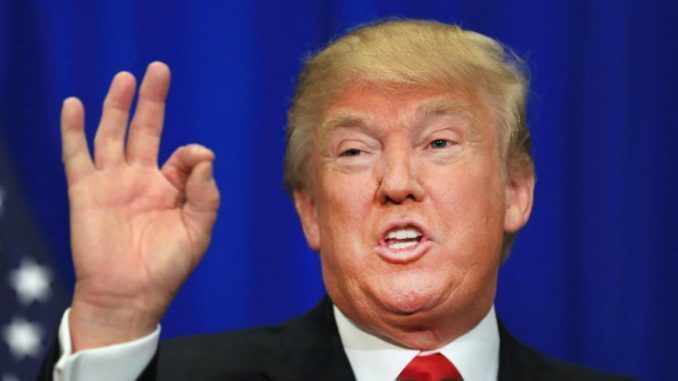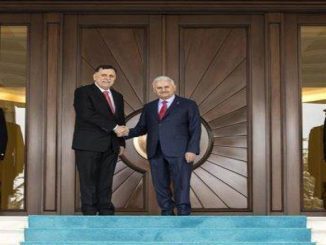
The new US president, Donald Trump, has signed an executive order that will limit immigration and refugees from some Muslim-majority countries, fulfilling a campaign-trail promise to introduce what he dubbed “extreme vetting.”
“I’m establishing new vetting measures to keep radical Islamic terrorists out of the United States of America. We don’t want them here. We want to ensure that we are not admitting into our country the very threats our soldiers are fighting overseas,” he said in a speech at the Pentagon.
The order bans Syrian refugees, claiming they are “detrimental” to the interests of the United States, and suspends the refugee admissions program for all countries for 120 days. It will also suspend the issue of visas to nationals of countries where the US believes they do not provide enough information on an applicant to decide whether or not they are a security or public safety threat.
Those countries are Iran, Iraq, Libya, Somalia, Sudan, Syria, and Yemen.
However, Trump did say earlier in the day that he would prioritize helping Syrian Christians. He also mentioned “radical Islamic terrorists” while signing it. And in the text, it carves out an exception for admitting refugees who are religious minorities even while nearly all others will be barred for 120 days.
Here’s what the order will do, with immediate effect:
- Block refugee admissions from the war-torn country of Syria indefinitely.
- Suspend refugee admissions from all countries for 120 days. During that period, the government can accept refugees on a case-by-case basis, but only in the following scenarios: if they are a religious minority facing religious persecution, if the U.S. must admit the person to meet an international agreement, or if they are already in transit and denying admission would cause undue hardship. After that period, the U.S. will only accept refugees from countries jointly approved by the Department of Homeland Security, the State Department and the Director of National Intelligence.
- Cap total refugee admissions for fiscal year 2017 at 50,000 ― less than half of the 110,000 proposed by the Obama administration.
- Ban for 90 days all “immigrant and nonimmigrant” entry of individuals from countries referred to in section 217(a)(12) of the INA, 8 U.S.C. 1187(a)(12).
- Suspend visa issuance to countries of “particular concern.” After 60 days, DHS, the State Department and DNI are instructed to draft a list of countries that don’t comply with requests for information. Foreign nationals from those countries will be banned from entering the U.S.
- Expedite the completion of a biometric entry-exit tracking system for all visitors to the U.S. and require in-person interviews for all individuals seeking a nonimmigrant visa.
- Suspend the visa interview waiver program indefinitely and review whether existing reciprocity agreements are reciprocal in practice.
The executive order, one of many during Trump’s first week in office, is a radical departure from President Barack Obama’s efforts to admit more refugees and improve relationships with Muslims.
Immediate implementation
The new policies are expected to affect tens of thousands of people: refugees preparing to come to the U.S.; foreign nationals, immigrants and would-be visitors from designated countries; and Americans whose families will now be unable to visit.
The order means that about 500,000 green card holders who reside in the U.S. but are originally from one of the seven countries will need a waiver to return to their homes, White House officials said Saturday. It also applies to people from the seven countries who hold dual citizenship and are not U.S. citizens. This means that people of both French and Yemeni nationality, for example, would be denied entry.
The State Department is working to implement the executive order’s changes immediately, spokesman Mark Toner said in a statement. He said the agency will announce changes affecting travelers as soon as possible.
On Saturday afternoon, nearly 24 hours after Trump signed the order, a White House official said the administration was still working to determine the exact meaning of a very important piece of language: “in transit.” The order says that authorities may “determine to admit individuals to the United States as refugees on a case-by-case basis” in instances “when the person is already in transit and denying admission would cause undue hardship.”
Trump’s executive action fulfills his campaign promise to bar Syrian refugees and partially fulfills his vow to temporarily ban Muslims from the U.S. — a promise he later amended to apply only to people from certain Muslim-majority countries.
During his run for president, Trump repeatedly suggested that Syrian refugees and Muslim immigrants are likely terrorists.
Ironically, Trump issued earlier a statement on Holocaust Remembrance Day that spoke about “the victims, survivors, heroes of the Holocaust” without once naming who most of them were: Jews persecuted and discriminated against based on their religion.
“In the name of the perished, I pledge to do everything in my power throughout my Presidency, and my life, to ensure that the forces of evil never again defeat the powers of good,” Trump said. “Together, we will make love and tolerance prevalent throughout the world.”



